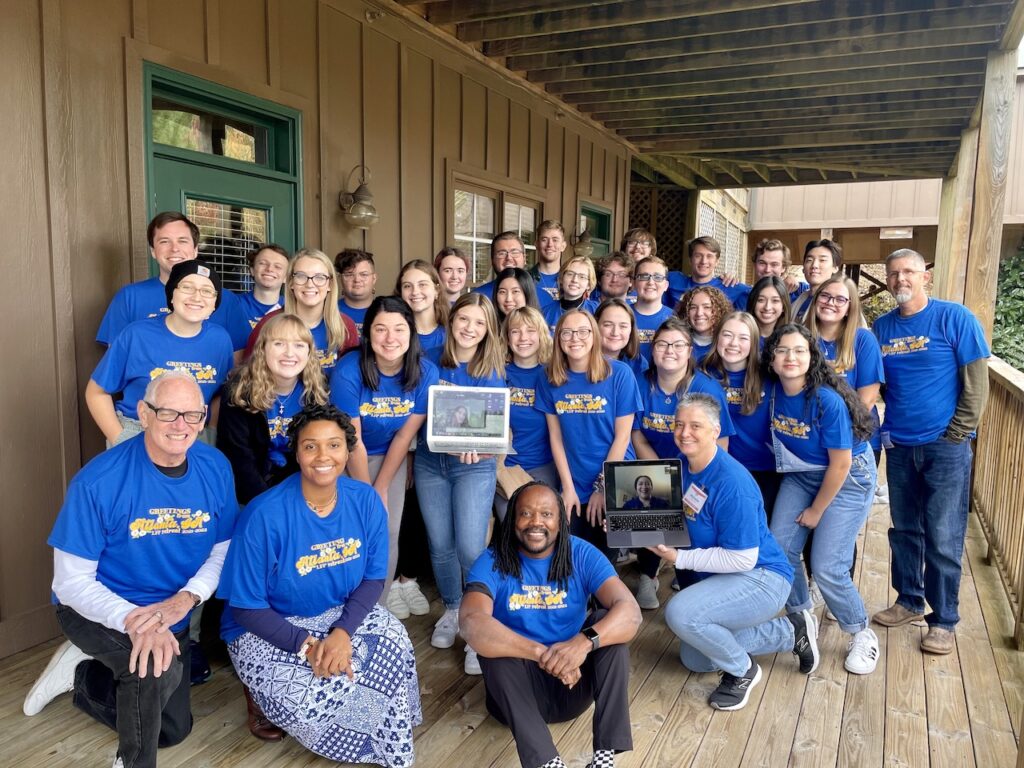 Being able to gather in-person this year was such a blessing! One of the most notable takeaways from the weekend was the gift of authentic Christian community. As first year students, we read and discussed Dietrich Bonhoeffer’s book Life Together. Written while in a concentration camp during World War II, Bonhoeffer found inspiration in the Black churches of New York, prompting a book addressing the need for change he saw within Christian communities of his time. His pleas centered around the idea that the issue of community was not just a theological concern but a practical one as well. When oppression existed, communities of faith had to respond, while simultaneously widening their faith communities to be inclusive for all. Bonhoeffer argued that if one was not living as an embodiment of Christ through one’s action, one was not actually partaking in communion and Christian community. Whatever was happening in the moment was to be a concern to the church because Jesus, at that moment, was concerned as well. I believe the arguments of Bonhoeffer remain relevant for the modern church today, and so we explored the application of these ideas within our current context.
Being able to gather in-person this year was such a blessing! One of the most notable takeaways from the weekend was the gift of authentic Christian community. As first year students, we read and discussed Dietrich Bonhoeffer’s book Life Together. Written while in a concentration camp during World War II, Bonhoeffer found inspiration in the Black churches of New York, prompting a book addressing the need for change he saw within Christian communities of his time. His pleas centered around the idea that the issue of community was not just a theological concern but a practical one as well. When oppression existed, communities of faith had to respond, while simultaneously widening their faith communities to be inclusive for all. Bonhoeffer argued that if one was not living as an embodiment of Christ through one’s action, one was not actually partaking in communion and Christian community. Whatever was happening in the moment was to be a concern to the church because Jesus, at that moment, was concerned as well. I believe the arguments of Bonhoeffer remain relevant for the modern church today, and so we explored the application of these ideas within our current context.
Building on the ideas shared by Bonhoeffer, I loved collaborating with the group to form a shared understanding of what cultivates authentic community. HELM President, Rev. Chris Dorsey, shared a fantastic plenary talk which encouraged me to think critically about how to create and sustain communities where everyone actually belongs. He shared four main points to consider when trying to cultivate these genuine communities. First, faith and values matter. In a time in which so much is politicized and divisive, Rev. Dorsey encouraged us to remain in conversation about differences so we can seek understanding from others without letting the nuances divide us. He also highlighted the power of identifying shared values. We all have much more in common than we think, and our values help us shape our faiths, so identifying these shared values can unite us. Further, he emphasized the importance of how history matters. To live in a genuine community with others who are different from us, we must understand the history of communities who have been hurt or marginalized. Building on the need for a strong understanding of history, cultural competence matters. One notable remark that will stick with me was that “respect” is culturally significant; one may be disrespectful every day to people from other culture’s if one is not informed on how that culture shows and receives respect. Rev. Dorsey encouraged us to dive deeply into cultural specificity and the nuances of culture to help us better cultivate communities of Christ that are more inclusive and authentic. Lastly, I take away the importance of vulnerability and leaning into the situations and feelings which make us uncomfortable. Vulnerability helps us not only learn about ourselves but also the communities of which we are a part. Rev. Dorsey shared, “If you can be vulnerable enough in a moment, you can learn.”
Through vulnerability, over the HELM retreat weekend our cohorts grew closer in our relationships with each other and with God. When space was created to hold all our differences, nuances, and the parts of us that make us unique, we felt safe to share more intimately the thoughts and nuances of our faiths that we would not have felt safe to share elsewhere. HELM created a safe space for us all to learn and grow. I am deeply grateful for this year’s HELM retreat, for the opportunity to gather in a sacred community, and for the lessons I learned.
